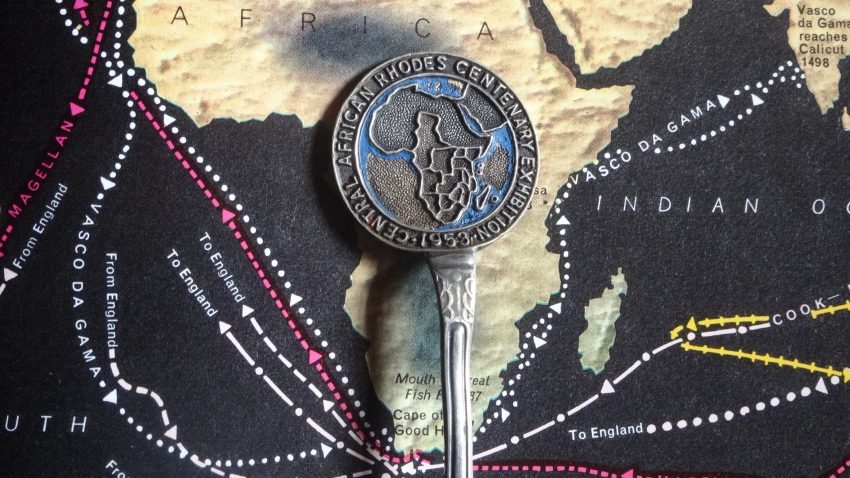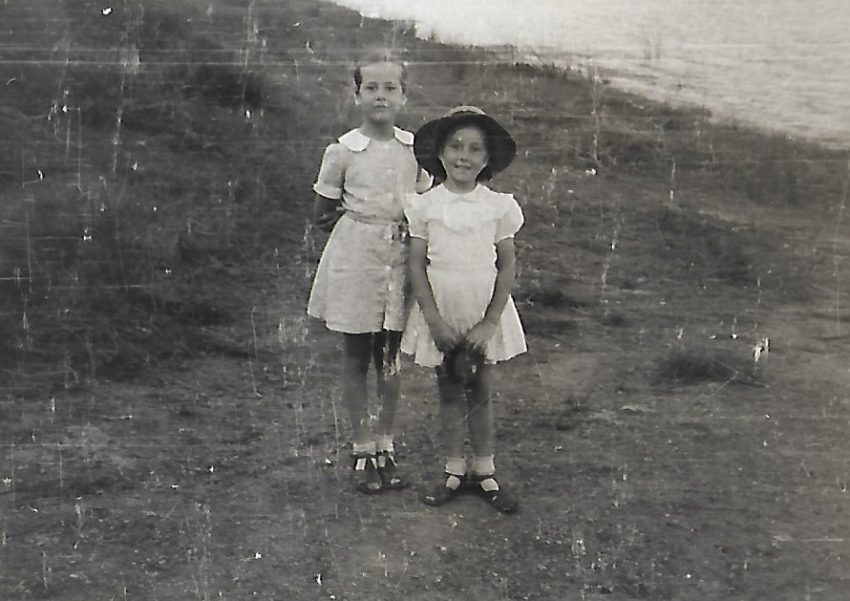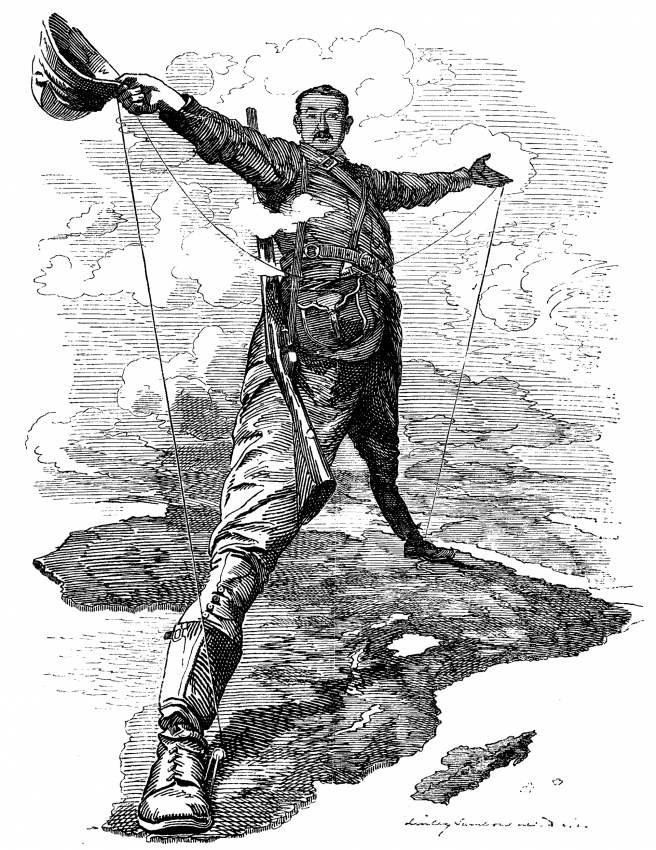I was 37 when Rhodesia became Zimbabwe in 1980 – 40 years ago. I was in Zimbabwe then and I rejoiced at that change. Rhodesia had lasted a surprisingly short time. Now, as I watch the Rhodes Must Fall campaign I wonder if we will learn from this past history if we remove it from our view or if we will be doomed to repeat it? We are already living in the future – we are the history we are making – what statues and symbols of flawed heroes will we erect in the future?

In 1953 I was 10 and living in Rhodesia

1953 was the centenary of Rhodes’s birth in Britain. Cecil John Rhodes, I was taught, was the hero who had founded Rhodesia a mere 60 years previously. I was taken on a school train trip to Bulawayo for the celebration event held inside the new Comet aeroplane hangar. I came back with a silver teaspoon decorated with an Africa almost all covered in red enamel. Rhodes had been dead for 40 years. Less than 30 years later Rhodesia would become Zimbabwe. My grandfather was born before Rhodesia existed and my grandmother died after Rhodesia became Zimbabwe.
In 1962, I went to art school in Cape Town
The Republic of South Africa was one year old. The1960 Sharpeville massacre had taken place. Martin Luther King Jr was alive but hadn’t yet spoken of his Dream. Enoch Powell had not yet spoken of Rivers of Blood and the first black British MP, Dr David Pitt, had not yet been elected. Apartheid and the Group Areas Act were coming into force in South Africa. Nelson Mandela had not yet been convicted and sent to prison on Robben Island. The Windrush had berthed in Britain 14 years earlier. That year President Kennedy sent thousands of troops to stop riots when a black student, James Meredith, enrolled at the University of Mississippi. The US had started to spray Agent Orange in the Vietnam War. Bob Dylan was singing “The times they are a-changing!”. James Baldwin had not yet won the debate about the American Dream and the Negro at the Cambridge University Union.
My family’s history and my inheritance.

In 1910 the Union of South Africa was formed from four colonies. The Cape Colony had been in existence for 309 years before that and the other three colonies less than 70 years each. My family came to the Cape Colony in the 1820s and to Rhodesia in 1922. My education was paid for in part by the mining industries of Northern and Southern Rhodesia, legacies of Rhodes’s enterprises. Rhodes’s statue was on the steps of Cape Town University, the Rhodes Memorial was above it on Devil’s Peak. Rhodes endowed South African universities and amassed a fortune which he left to the people of South Africa and both of the Rhodesias (and ultimately to Zambia and Zimbabwe). My wicked university friends and I climbed under the fence at Groote Schuur, the estate left to the SA government by Rhodes for the SA Prime Minister, to explore the gardens Rhodes created. There were no armed guards. We weren’t arrested. It is true that Rhodes became phenomenally wealthy and was an ambitious imperialist but he did not succeed in fulfilling his dreams and died before he was 50. His endowments have educated many, regardless of their race.
Repaying debts to my African home
The Rhodes Scholarships, the Mandela Rhodes Trust and the Bodleian Library collection of Commonwealth and African Studies are part of Rhodes’s educational trust. My life and education then gave me “the same ideals of peace, progress, human solidarity and a better life for all people” that Nelson Mandela had always had and that he advocated when he set up the Mandela Rhodes Trust in 2004. In 2016 Ntokozo Qwabe said of his acceptance of a Rhodes scholarship -“this scholarship does not buy our silence…There is no hypocrisy in being a recipient of a Rhodes scholarship and being publicly critical of Cecil Rhodes and his legacy… There is no clause that binds us to find ‘the good’ in Rhodes’ character, nor to sanitise the imperialist, colonial agenda he propagated.” I felt the same in 1962 as Qwabe said then. Oxford University said that Qwabe was entitled to free speech – I don’t agree with all Qwabe says but that is still his right. What I expect – and hope – today is that South African universities will continue to be rigorous and anti-racist in their research and get their facts right.
I can say, as James Baldwin said in 1965 – “I am what time, circumstance, history, have made of me, certainly, but I am also so much more than that. So are we all.”
Apart from my work with Zambian artists, I have written anti-colonial novels, memoirs and poetry. I was able to research colonial history of the Gwembe Valley gun battle in the Bodleian collection and all my books have been accepted into it. There I hope they will bear witness to our changing history. We are the history we change. We must never erase history even if we do choose a new direction for it and put up new symbols. The statues of Rhodes must fall. Africa is making its own history and its own future now as we breathe.
10 Comments on “Rhodes Must Fall”
If we could give up the desire to create heroes, we might be able to get on with an objective view of history as something that fallible human beings created as they lived in past conditions.
I suppose heroes are always one-dimensional as mythic beings? They are always flawed in mythology too – and if not, the Gods conspire to humble them usually in horrible ways. If bringing down the Colston statue was to redress slavery by removing the “graven image” of the slaver – its only a small symbolic act. Would it be better if the whole of Bristol was reduced to rubble as its a city built on slavery? The whole business gets so reductive it isn’t useful. I agree with you – somehow we need to move forward. Why do we live backwards so much? I was amused by a comment by a Muslim about the lack of statues of the Prophet. Images of man are also forbidden by Jewish law. Is that better – or in the end will we always find substitutes for statues that become controversial?
If they made statue of that astonishing writer, Charles Dickens, I would never be able to look at it without feeling fury at the way he treated his wife (and children), but I would not want to tear it down.
Is there a statue of Dickens in the Abbey? There must be one somewhere! Yes – he was an appalling and cruel husband and yet gave us so much human experience and in the end – hope. There’s nobody who is all good anywhere – does that mean there’s no one who is completely bad? Where would artists be if nobody commissioned statues of the famous?
The gift that the figures of history create is their legacy, irrespective of their individual weaknesses or strengths.
I suppose that immortalising somebody matters to us who so quickly disappear from history and are forgotten – in some ways they do stand for what we hope is the best in us even if perhaps they may have done terrible things too – I wonder?
Lovely photograph, Ruth!
Thank you Jon
Those who do not learn from the mistakes from history are doomed to forever repeat those mistakes.Can’t remember who said it but there is some truth in it!
Hello Ruth I hope you are well
Hello Barbara – yes indeed – sometimes we don’t even realise we are quoting? from someone else – maybe that’s because what is said has become so much part of life. I’m well and busy.Hope you are too.